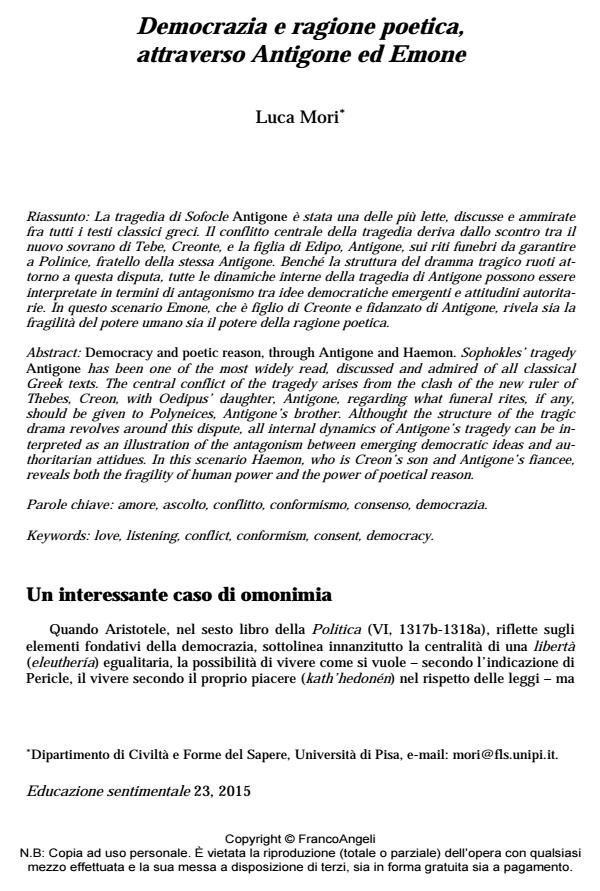Democrazia e ragione poetica, attraverso Antigone ed Emone
Journal title EDUCAZIONE SENTIMENTALE
Author/s Luca Mori
Publishing Year 2015 Issue 2015/23
Language Italian Pages 7 P. 109-115 File size 58 KB
DOI 10.3280/EDS2015-023010
DOI is like a bar code for intellectual property: to have more infomation
click here
Below, you can see the article first page
If you want to buy this article in PDF format, you can do it, following the instructions to buy download credits

FrancoAngeli is member of Publishers International Linking Association, Inc (PILA), a not-for-profit association which run the CrossRef service enabling links to and from online scholarly content.
La tragedia di Sofocle Antigone è stata una delle più lette, discusse e ammirate fra tutti i testi classici greci. Il conflitto centrale della tragedia deriva dallo scontro tra il nuovo sovrano di Tebe, Creonte, e la figlia di Edipo, Antigone, sui riti funebri da garantire a Polinice, fratello della stessa Antigone. Benché la struttura del dramma tragico ruoti attorno a questa disputa, tutte le dinamiche interne della tragedia di Antigone possono essere interpretate in termini di antagonismo tra idee democratiche emergenti e attitudini autoritarie. In questo scenario Emone, che è figlio di Creonte e fidanzato di Antigone, rivela sia la fragilità del potere umano sia il potere della ragione poetica. Abstract: Democracy and poetic reason, through Antigone and Haemon. Sophokles’ tragedy Antigone has been one of the most widely read, discussed and admired of all classical Greek texts. The central conflict of the tragedy arises from the clash of the new ruler of Thebes, Creon, with Oedipus’ daughter, Antigone, regarding what funeral rites, if any, should be given to Polyneices, Antigone’s brother. Althought the structure of the tragic drama revolves around this dispute, all internal dynamics of Antigone’s tragedy can be interpreted as an illustration of the antagonism between emerging democratic ideas and authoritarian attidues. In this scenario Haemon, who is Creon’s son and Antigone’s fiancee, reveals both the fragility of human power and the power of poetical reason.
Keywords: Love, listening, conflict, conformism, consent, democracy
- Belardinelli A. M., Greco G., a cura di (2010). Antigone e le Antigoni. Storia, forme, fortuna di un mito. Atti del Convegno Internazionale. Firenze: Le Monnier Università.
- Butler J. (2003). La rivendicazione di Antigone. La parentela tra la vita e la morte. Torino: Boringhieri.
- Foucault M. (1998). Discorso e verità nella Grecia antica. Roma: Donzelli.
- Lacan J. (2008). Il seminario. Libro VII. L’etica della psicoanalisi (1959-1960). Torino: Einaudi.
- Lesky A. (2005). Storia della letteratura greca. Vol. I. Dagli inizi a Erodoto. Milano: Il Saggiatore.
- Montani P., a cura di (2001). Antigone e la filosofia. Roma: Donzelli.
- Morelli U., Mori L. (2013). Il codice materno del potere. Autorità, partecipazione, democrazia. Pisa: Edizioni ETS.
- Musti D. (1995). Demokratia. Origini di un’idea. Roma-Bari: Laterza.
- Nussbaum M. (1996). La fragilità del bene. Fortuna ed etica nella tragedia e nella filosofia greca. Bologna: Il Mulino.
- Petrucciani S. (2014). Democrazia. Torino: Einaudi.
- Ricoeur P. (2012). Le Tragique et la promesse. In: O. Abel, a cura di, Paul Ricoeur, Jacques Ellul, Jean Carbonnier, Pierre Chaunu. Dialogues. Genève: Labor et Fides, pp. 28-31.
- Sofocle (2009). Edipo Re, Edipo a Colono, Antigone. Trad. it.: V. Faggi, a cura di S. Beta. Torino: Einaudi.
- Sofocle (2012). Antigone. Introduzione, traduzione e commento di D. Susanetti. Roma: Carocci Editore.
Luca Mori, Democrazia e ragione poetica, attraverso Antigone ed Emone in "EDUCAZIONE SENTIMENTALE" 23/2015, pp 109-115, DOI: 10.3280/EDS2015-023010